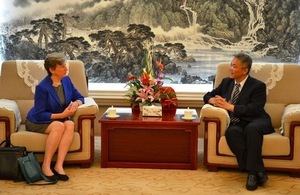CASS invests in first major international scheme with UK Research Councils
Four new UK-China partnerships to strengthen research in the social sciences and arts and humanities have been announced on 9 September.

Prof. Jane Elliotts discusses possible areas of future collaboration with Dr. Wang Lei, Director General of International Cooperation Bureau of the Chinese Academy of Social Sciences (CASS)
The announcement coincides with the first official visit to China by RCUK International Champion and Chief Executive of ESRC, Professor Jane Elliott.
The projects will be funded under the ESRC-AHRC-CASS International Centre Partnerships scheme, the first joint programme funded by the Chinese Academy of Social Sciences (CASS), Economic and Social Research Council (ESRC) and the Arts and Humanities Research Council (AHRC). Facilitated by RCUK China, the total funding available for the UK for this call (AHRC and ESRC) was £900,000, with matched equivalent resources from CASS.
The ESRC and AHRC funding for this initiative is from the Newton Fund which is aimed at developing science and innovation partnerships that promote the economic development and welfare of developing countries.
Professor Jane Elliott said:
The excellent proposals submitted to this scheme demonstrate the high quality of research in the social sciences and the arts and humanities in both the UK and China. I am delighted that the Newton Fund has enabled us to support these four innovative and collaborative projects and to strengthen the links between the UK and China.
Dr Wang Lei, Director General of International Cooperation Bureau of the Chinese Academy of Social Sciences, also stated:
CASS regards ESRC and AHRC as its major partners in promoting scientific cooperation in social sciences and humanities between China and UK. CASS hopes that the International Centre Partnerships scheme, which is a milestone in the cooperation between CASS and ESRC-AHRC, would be a great success and that it can serve as a good example for further joint undertakings between partner institutions.
The four new partnerships funded under this scheme are:
- Adapting the Health and Welfare System to a Context of Rapid Change (Institute of Development Studies, ESRC and Institute of Sociology, CASS)
- Behavioural Compatibility between Individual Choice and Collective Action (Tax Administration Research Centre, ESRC and Institute of Quantitative & Technical Economics, CASS)
- Urban Development, Migration, Segregation and Inequality (Urban Big Data Centre and the Applied Quantitative Methods Network, ESRC and Institute of Urban and Environmental Studies(Chinese), CASS)
- Sustaining Ethno-Cultural Significance of Products through Urban Ecologies of Creative Practice (Lancaster Institute for the Contemporary Arts, AHRC and Institute of Ethnology and Anthropology, CASS)
Notes to editor
-
The Economic and Social Research Council (ESRC) is the UK’s largest funder of research on the social and economic questions facing us today. It supports the development and training of the UK’s future social scientists and also funds major studies that provide the infrastructure for research. ESRC-funded research informs policymakers and practitioners and helps make businesses, voluntary bodies and other organisations more effective. The ESRC also works collaboratively with six other UK research councils and Innovate UK to fund cross-disciplinary research and innovation addressing major societal challenges. The ESRC is an independent organisation, established by Royal Charter in 1965, and funded mainly by the Government. In 2015 it celebrates its 50th anniversary. www.esrc.ac.uk
-
The Arts and Humanities Research Council (AHRC) funds world-class research in a wide range of subjects: ancient history, modern dance, archaeology, digital content, philosophy, English literature, design, the creative and performing arts, and many more. Each year the AHRC spends approximately £98m to fund research and postgraduate training often in collaboration with partners. The quality and range of research supported by this investment of public funds provide considerable economic, social and cultural benefits to the UK.
-
Chinese Academy of Social Sciences (CASS) is the premier academic organization and comprehensive research centre of the People’s Republic of China in the fields of humanites and social sciences. Established in 1977, CASS is now made up of 31 research institutes and 45 research centres, which carry out research activities covering almost all disciplines in humanities and social sciences. At present, CASS has more than 3,000 researchers. Conducting broad international academic exchange remains one of CASS’s guidelines, and this has gained pace in recent years. CASS has established a constructive relationship with over 200 research organizations, think tanks, institutions of higher learning, foundations and related government departments, covering more than 100 countries and regions. http://casseng.cssn.cn/
-
The Newton Fund is a £375 million fund (£75 million a year for five years) which, through science and innovation partnerships aims to promote the economic development and welfare of poor people in developing countries. The Fund is overseen by the Department for Businesses Innovation and Skills (BIS) and delivered through 15 delivery partners in collaboration with 15 partnering countries. For more information visit: www.newtonfund.ac.uk
-
RCUK China was the first overseas team set up outside of Europe by the UK Research Councils. Since 2007, the team has built excellent relationships with all the major national funding agencies in China, pioneering the facilitation of UK-China research partnerships across areas of natural, physical and medical sciences, engineering, social science, arts and the humanities. To date, RCUK China has facilitated over £160 million in co-funded programmes supporting 78 UK-China research projects that have involved more than 60 universities and 50 industry partners in both countries. RCUK China currently has six members of staff and is co-located in the British Embassy in Beijing.